Julian Gutierrez
Parametric and Generative Forecasts of Day-Ahead Market Curves for Storage Optimization
Jan 28, 2026Abstract:We present two machine learning frameworks for forecasting aggregated curves and optimizing storage in the EPEX SPOT day-ahead market. First, a fast parametric model forecasts hourly demand and supply curves in a low-dimensional and grid-robust representation, with minimum and maximum volumes combined with a Chebyshev polynomial for the elastic segment. The model enables daily use with low error and clear interpretability. Second, for a more comprehensive analysis, though less suited to daily operation, we employ generative models that learn the joint distribution of 24-hour order-level submissions given weather and fuel variables. These models generate synthetic daily scenarios of individual buy and sell orders, which, once aggregated, yield hourly supply and demand curves. Based on these forecasts, we optimize a price-making storage strategy, quantify revenue distributions, and highlight the price-compression effect with lower peaks, higher off-peak levels, and diminishing returns as capacity expands.
On the Complexity of Rational Verification
Jul 06, 2022
Abstract:Rational verification refers to the problem of checking which temporal logic properties hold of a concurrent multiagent system, under the assumption that agents in the system choose strategies that form a game-theoretic equilibrium. Rational verification can be understood as a counterpart to model checking for multiagent systems, but while classical model checking can be done in polynomial time for some temporal logic specification languages such as CTL, and polynomial space with LTL specifications, rational verification is much harder: the key decision problems for rational verification are 2EXPTIME-complete with LTL specifications, even when using explicit-state system representations. Against this background, our contributions in this paper are threefold. First, we show that the complexity of rational verification can be greatly reduced by restricting specifications to GR(1), a fragment of LTL that can represent a broad and practically useful class of response properties of reactive systems. In particular, we show that for a number of relevant settings, rational verification can be done in polynomial space and even in polynomial time. Second, we provide improved complexity results for rational verification when considering players' goals given by mean-payoff utility functions; arguably the most widely used approach for quantitative objectives in concurrent and multiagent systems. Finally, we consider the problem of computing outcomes that satisfy social welfare constraints. To this end, we consider both utilitarian and egalitarian social welfare and show that computing such outcomes is either PSPACE-complete or NP-complete.
Rational Verification for Probabilistic Systems
Jul 26, 2021


Abstract:Rational verification is the problem of determining which temporal logic properties will hold in a multi-agent system, under the assumption that agents in the system act rationally, by choosing strategies that collectively form a game-theoretic equilibrium. Previous work in this area has largely focussed on deterministic systems. In this paper, we develop the theory and algorithms for rational verification in probabilistic systems. We focus on concurrent stochastic games (CSGs), which can be used to model uncertainty and randomness in complex multi-agent environments. We study the rational verification problem for both non-cooperative games and cooperative games in the qualitative probabilistic setting. In the former case, we consider LTL properties satisfied by the Nash equilibria of the game and in the latter case LTL properties satisfied by the core. In both cases, we show that the problem is 2EXPTIME-complete, thus not harder than the much simpler verification problem of model checking LTL properties of systems modelled as Markov decision processes (MDPs).
Equilibrium Design for Concurrent Games
Jun 18, 2021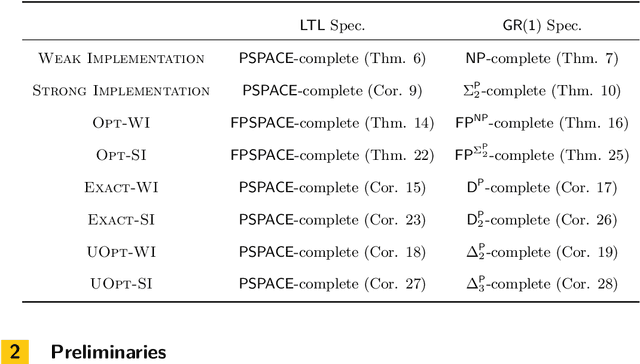
Abstract:In game theory, mechanism design is concerned with the design of incentives so that a desired outcome of the game can be achieved. In this paper, we study the design of incentives so that a desirable equilibrium is obtained, for instance, an equilibrium satisfying a given temporal logic property -- a problem that we call equilibrium design. We base our study on a framework where system specifications are represented as temporal logic formulae, games as quantitative concurrent game structures, and players' goals as mean-payoff objectives. In particular, we consider system specifications given by LTL and GR(1) formulae, and show that implementing a mechanism to ensure that a given temporal logic property is satisfied on some/every Nash equilibrium of the game, whenever such a mechanism exists, can be done in PSPACE for LTL properties and in NP/$\Sigma^{P}_{2}$ for GR(1) specifications. We also study the complexity of various related decision and optimisation problems, such as optimality and uniqueness of solutions, and show that the complexities of all such problems lie within the polynomial hierarchy. As an application, equilibrium design can be used as an alternative solution to the rational synthesis and verification problems for concurrent games with mean-payoff objectives whenever no solution exists, or as a technique to repair, whenever possible, concurrent games with undesirable rational outcomes (Nash equilibria) in an optimal way.
* CONCUR 2019 with appendix
Multi-Agent Reinforcement Learning with Temporal Logic Specifications
Feb 09, 2021



Abstract:In this paper, we study the problem of learning to satisfy temporal logic specifications with a group of agents in an unknown environment, which may exhibit probabilistic behaviour. From a learning perspective these specifications provide a rich formal language with which to capture tasks or objectives, while from a logic and automated verification perspective the introduction of learning capabilities allows for practical applications in large, stochastic, unknown environments. The existing work in this area is, however, limited. Of the frameworks that consider full linear temporal logic or have correctness guarantees, all methods thus far consider only the case of a single temporal logic specification and a single agent. In order to overcome this limitation, we develop the first multi-agent reinforcement learning technique for temporal logic specifications, which is also novel in its ability to handle multiple specifications. We provide correctness and convergence guarantees for our main algorithm - ALMANAC (Automaton/Logic Multi-Agent Natural Actor-Critic) - even when using function approximation. Alongside our theoretical results, we further demonstrate the applicability of our technique via a set of preliminary experiments.
Multi-Player Games with LDL Goals over Finite Traces
Aug 13, 2020Abstract:Linear Dynamic Logic on finite traces LDLf is a powerful logic for reasoning about the behaviour of concurrent and multi-agent systems. In this paper, we investigate techniques for both the characterisation and verification of equilibria in multi-player games with goals/objectives expressed using logics based on LDLf. This study builds upon a generalisation of Boolean games, a logic-based game model of multi-agent systems where players have goals succinctly represented in a logical way. Because LDLf goals are considered, in the settings we study -- Reactive Modules games and iterated Boolean games with goals over finite traces -- players' goals can be defined to be regular properties while achieved in a finite, but arbitrarily large, trace. In particular, using alternating automata, the paper investigates automata-theoretic approaches to the characterisation and verification of (pure strategy Nash) equilibria, shows that the set of Nash equilibria in multi-player games with LDLf objectives is regular, and provides complexity results for the associated automata constructions.
Equilibria for Games with Combined Qualitative and Quantitative Objectives
Aug 13, 2020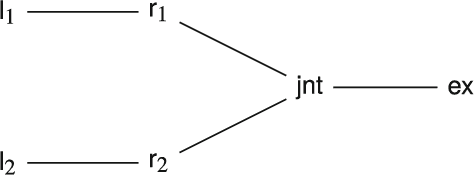
Abstract:The overall aim of our research is to develop techniques to reason about the equilibrium properties of multi-agent systems. We model multi-agent systems as concurrent games, in which each player is a process that is assumed to act independently and strategically in pursuit of personal preferences. In this article, we study these games in the context of finite-memory strategies, and we assume players' preferences are defined by a qualitative and a quantitative objective, which are related by a lexicographic order: a player first prefers to satisfy its qualitative objective (given as a formula of Linear Temporal Logic) and then prefers to minimise costs (given by a mean-payoff function). Our main result is that deciding the existence of a strict epsilon Nash equilibrium in such games is 2ExpTime-complete (and hence decidable), even if players' deviations are implemented as infinite-memory strategies.
Automated Temporal Equilibrium Analysis: Verification and Synthesis of Multi-Player Games
Aug 13, 2020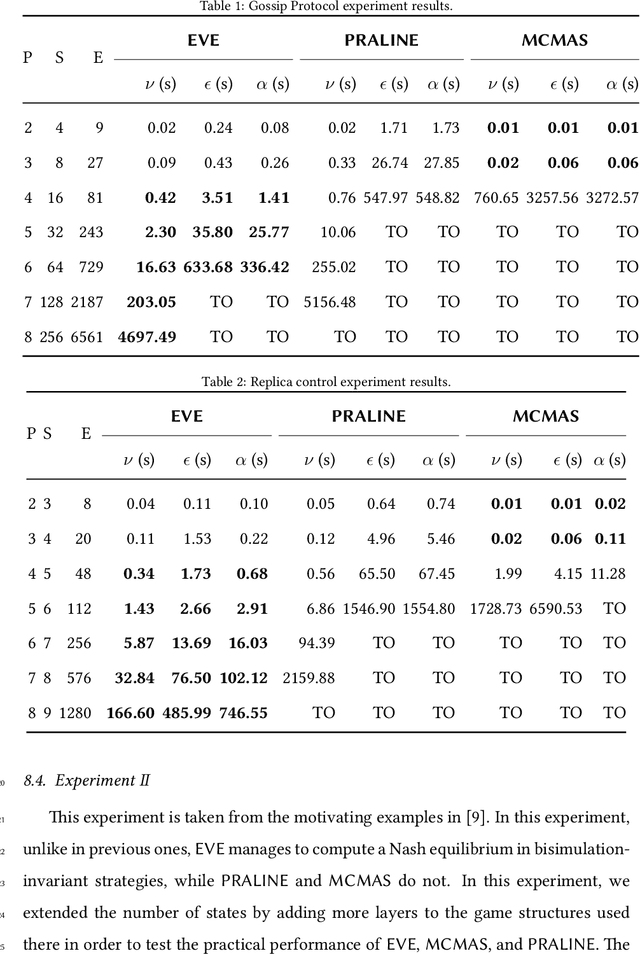
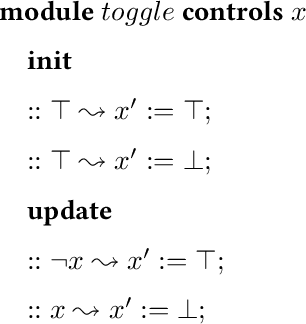
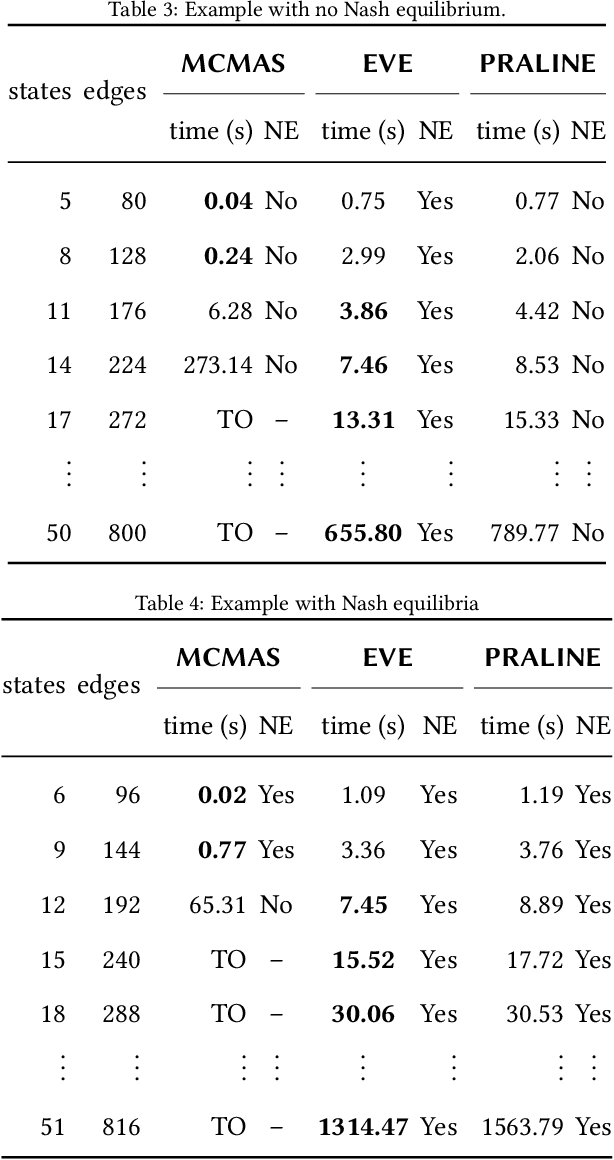
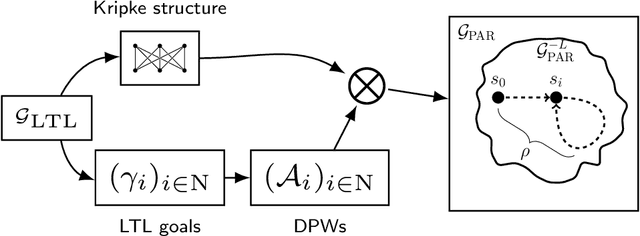
Abstract:In the context of multi-agent systems, the rational verification problem is concerned with checking which temporal logic properties will hold in a system when its constituent agents are assumed to behave rationally and strategically in pursuit of individual objectives. Typically, those objectives are expressed as temporal logic formulae which the relevant agent desires to see satisfied. Unfortunately, rational verification is computationally complex, and requires specialised techniques in order to obtain practically useable implementations. In this paper, we present such a technique. This technique relies on a reduction of the rational verification problem to the solution of a collection of parity games. Our approach has been implemented in the Equilibrium Verification Environment (EVE) system. The EVE system takes as input a model of a concurrent/multi-agent system represented using the Simple Reactive Modules Language (SRML), where agent goals are represented as Linear Temporal Logic (LTL) formulae, together with a claim about the equilibrium behaviour of the system, also expressed as an LTL formula. EVE can then check whether the LTL claim holds on some (or every) computation of the system that could arise through agents choosing Nash equilibrium strategies; it can also check whether a system has a Nash equilibrium, and synthesise individual strategies for players in the multi-player game. After presenting our basic framework, we describe our new technique and prove its correctness. We then describe our implementation in the EVE system, and present experimental results which show that EVE performs favourably in comparison to other existing tools that support rational verification.
 Add to Chrome
Add to Chrome Add to Firefox
Add to Firefox Add to Edge
Add to Edge